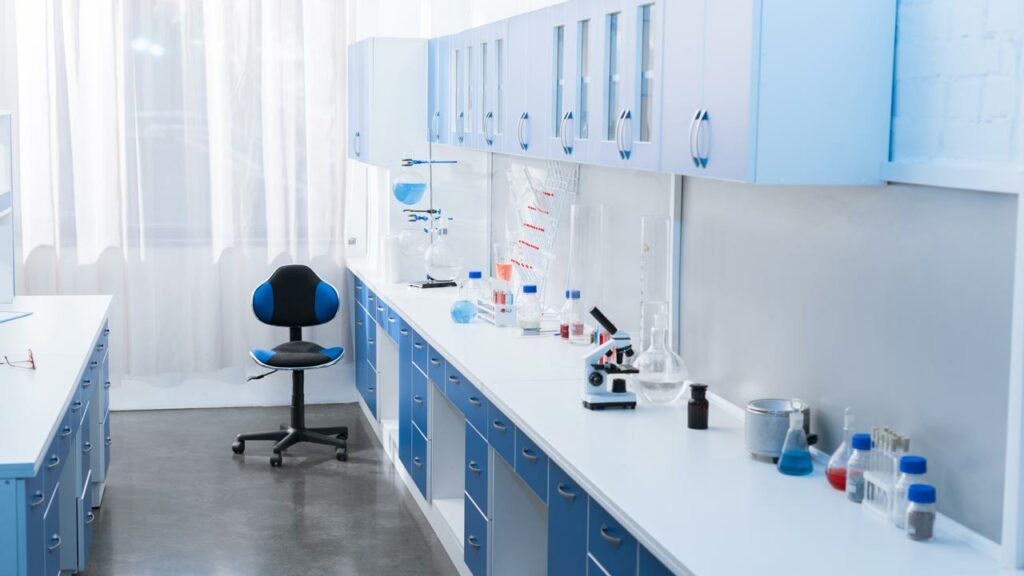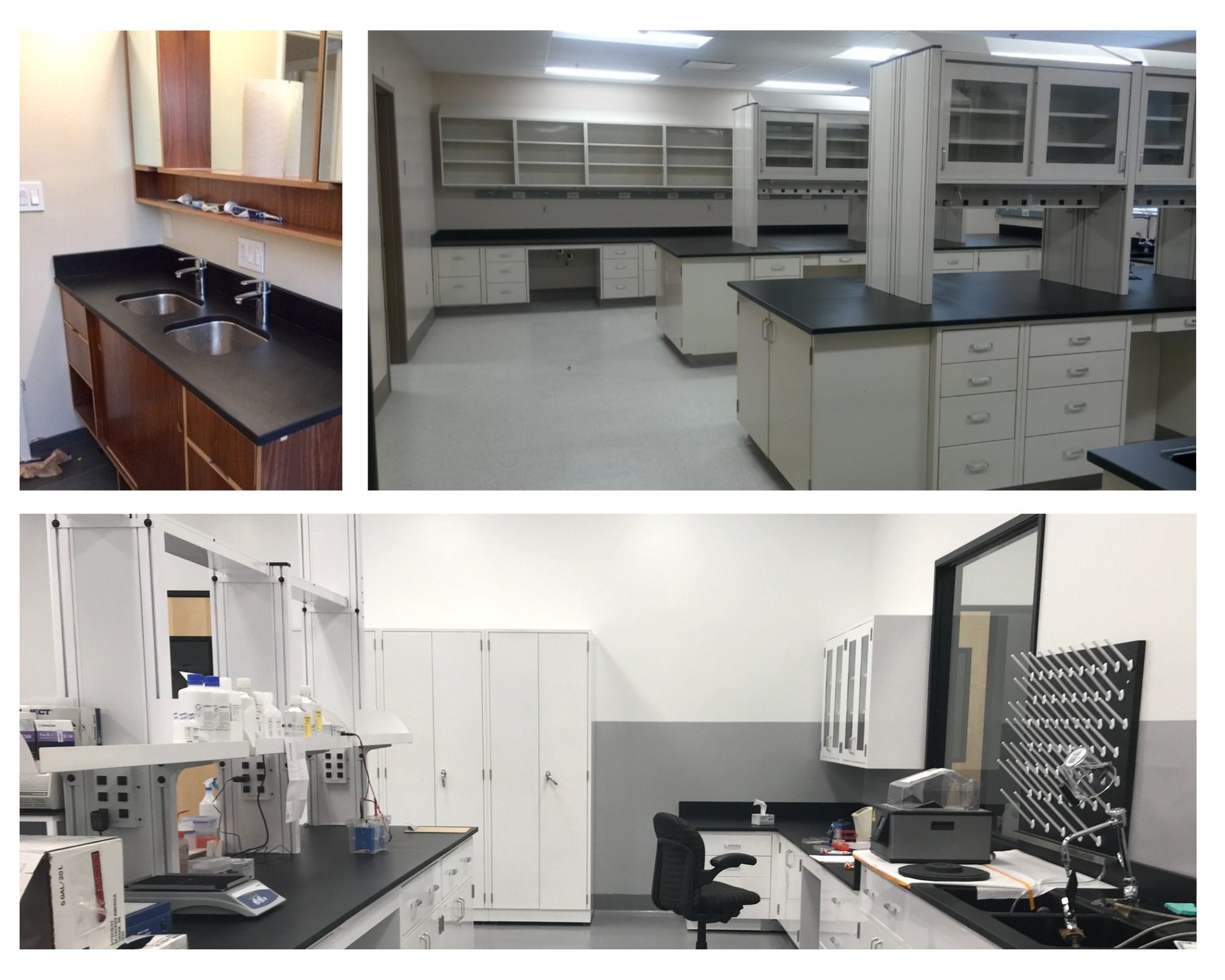Pharmaceutical laboratories, water treatment plants, and scientific applications are all ideal for solid surface countertops. A phenolic resin countertop is an excellent choice if your laboratory’s workspace requires a durable work surface.
As compared to similar materials on the market, these materials are durable, lightweight, affordable, and inexpensive.
Choosing the right laboratory countertops for the first time is imperative to ensuring long-term success because materials, equipment, and cleanliness requirements all contribute to the overall integrity of the lab.
The durability and ability to withstand challenging environments have made phenolic resin a popular choice among labs today.
How is Phenolic Resin Made?
By layering saturated fibers with resin, the phenolic resin becomes a super-solid material. Heat-intensive processes and high pressure are used to cure phenolic resin countertops once the layers of natural kraft papers are stacked.
Phenolic resin’s tensile strength is significantly increased with layers applied prior to curing, and its versatility and customization are further improved by the ability to cut fibers or paper to size.
The compounds that make up phenolic resin are phenol and formaldehyde, creating complex structures made from molecules that are permanently bonded together. Phenol formaldehyde resin properties vary depending on the proportion of formaldehyde to phenol, and whether a base or an acid catalyst is used.
For instance, excess formaldehyde can be used to create resoles using water and a base. Plywood layers are frequently bonded with a resole by applying continuous heat exposure and pressure. In laboratory environments, where water or harsh conditions are routinely encountered, this durability from the phenolic compact is especially advantageous.
As well as being low density and thermally insulating, phenol formaldehyde resin has excellent durability characteristics. Their versatility allows them to be molded into unique shapes in a variety of shapes, allowing them to adapt to a variety of applications.
In lab furniture, phenolic resin is the preferred material due to these qualities compared to epoxy resin. Phenolic resin laboratory countertops are the best to use for laboratories where fire safety, combustion, toxicity, and smoke emissions standards need to be met.
The Difference Between Epoxy Resin and Phenolic Resin
There are many similarities between the epoxy resin and phenolic resin in terms of their function. From a manufacturing point of view, phenolic resin is an incredibly versatile material, and it lends itself well to a variety of custom projects.
It is primarily the heat handling capacity that differentiates the two. Phenolic resin countertops can withstand continuous heat exposure to temperatures up to 350°F or 176°C with no problems.
Under severe laboratory conditions, epoxy resin countertops will maintain their appearance and function under continuous exposure to heat loads including open flames.
Although epoxy resin is a great choice for lab environments involving severe caustic chemicals or sustained high temperatures, phenolic resin countertops are the clear contender for most applications.
Benefits of Using a Phenolic Resin Countertop
Work surfaces made of phenolic resin meet lab requirements and have lots of benefits. Among the advantages this type of technology provides is bacterial resistance, as well as relative resistance to wear, water, chemicals, and heat.
Worktops in lab environments are required to be constructed from materials that are resistant to scuffs, spills, and abrasion since a wide range of chemicals are commonly used during laboratory work and experiments.
Using Phenolic Resin for Your Laboratory
It is common for laboratory work surfaces and furniture to be stained by chemicals of all kinds. A lab’s worktop must be easy to clean and maintain, whether it is in a testing lab, medical lab, chemical lab, etc. In addition to being chemical resistant, it is also hygienic, durable, and easy to clean.
If you want to avoid problems in the future, you should choose the right lab furniture. Choosing the right surface not only affects the quality of the work, but it ensures long-term performance and is the most cost-effective.
Phenolic resin laboratory countertops won’t warp, or stain, even at extremely high or low temperatures. Having long-lasting, moisture-resistant, and scratch-resistant material—it maintains its aesthetic appeal over time.
In a lab environment where experimentation must be conducted in a contamination-free setting, clean phenolic resin countertops are a great choice.
Phenolic resin laboratory countertops are commonly used by companies in advanced electronics, ballistics, mining ventilation, aeronautics, pipelines, and transportation industries. It’s important to find a durable and non-reactive material for all these uses.
The Best Uses for Phenolic Resin Countertops
Lab furniture that is designed and manufactured using phenolic resins will benefit chemical, biological, analytical, testing, and clinical lab environments. A non-contaminated environment is crucial for laboratories like these when conducting tests and experiments.
Chemical resistant, hygienic, and impervious lab work surfaces can be easily cleaned and maintained in these labs, thanks to their chemical resistance, hygiene, and impervious qualities.
Having a successful lab operation is crucial to the success and efficiency of a business. There are many variables that need to be considered in the laboratory, each of which is unique and specific. To facilitate long-term use, durability must also be taken into account, not only acquisition costs.
In addition to contributing to the job satisfaction of employees, the appearance and aesthetics of the laboratory have an influence on clients’ perception of the laboratory.
In order for labs of all types to ensure the best possible working environment for the longest time possible, quality laboratory furniture made from phenolic resin is the best choice.
Why Choose Phenolic Resin?
Among the most useful materials when it comes to manufacturing is phenolic resin, which is easy to work with on a manufacturing level. This type of synthetic polymer is easy to customize and is much cheaper compared to epoxy resin countertops in terms of its cost.
It is easy to accommodate any customization. Moreover, it is readily available, so even if you want to design your own lab furniture, you will experience shorter lead times if you use this material compared to epoxy resin.
Additionally, they are highly resistant to stress and impact cracks. The performance of resin countertop products in labs is well known, as they keep laboratories operating smoothly, and keep them looking good for many years to come.
If you want to learn more, you can email us at sales@labtechsupplyco.com or call us at 800-476-5228 at ResinTops.net today!


